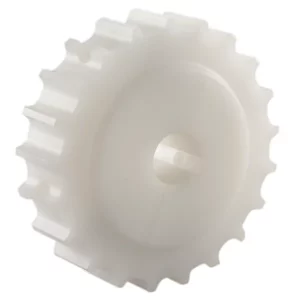#35 Plastic Sprockets
As one of the plastic sprocket manufacturers, suppliers, and exporters of mechanical products, We offer plastic sprocket and many other products.
Please get in touch with us for details.
Mail:[email protected]
Manufacturer supplier exporter of plastic sprocket.
#35 Plastic Sprockets
We are a leading supplier of plastic powertrain components. We have plastic sprockets available in ANSI size #25 – #80 and in UHMW, nylon, or nylon material. We can produce plastic metric, double pitch, duplex, engineer grade, and custom-designed sprockets. Some of the main benefits of using plastic roller sprockets are that they run quieter and produce better wear life on the roller chain. These sprockets are also highly resistant to corrosion, are very light, have high impact resistance, and are FDA approved.
#35 Plastic Sprockets Specification:
| Sprocket Size | Tooth Count | Material | Pitch Diameter | Stock Bore | Length Thru Bore |
|---|---|---|---|---|---|
|
35B9
|
9 | Nylatron | 1.096″ | 3/8″ | 3/4″ |
|
35B10
|
10 | Nylatron | 1.214″ | 3/8″ | 3/4″ |
|
35B11
|
11 | Nylatron | 1.331″ | 3/8″ | 3/4″ |
|
35B12
|
12 | Nylatron | 1.449″ | 1/2″ | 3/4″ |
|
35B14
|
14 | Nylatron | 1.685″ | 1/2″ | 3/4″ |
|
35B15
|
15 | Nylatron | 1.804″ | 1/2″ | 3/4″ |
|
35B16
|
16 | Nylatron | 1.922″ | 1/2″ | 3/4″ |
|
35B18
|
18 | Nylatron | 2.159″ | 1/2″ | 3/4″ |
|
35B20
|
20 | Nylatron | 2.397″ | 1/2″ | 7/8″ |
|
35B24
|
24 | Nylatron | 2.873″ | 1/2″ | 7/8″ |
|
35B26
|
26 | Nylatron | 3.111″ | 1/2″ | 7/8″ |
|
35B30
|
30 | Nylatron | 3.588″ | 1/2″ | 7/8″ |
|
35B35
|
35 | Nylatron | 4.183″ | 1/2″ | 7/8″ |
|
35B36
|
36 | Nylatron | 4.303″ | 5/8″ | 7/8″ |
|
35B40
|
40 | Nylatron | 4.780″ | 5/8″ | 7/8″ |
|
35B45
|
45 | Nylatron | 5.376″ | 5/8″ | 1″ |
Plastic Sprocket Advantages:
Plastic chains and sprockets are used in many industries and applications. They are made of durable polymer materials that offer wear and corrosion resistance as well as noise reduction benefits. These components are typically utilized in industries such as food and beverage, packaging, and wastewater treatment. Some plastic chains and sprockets are USDA/FDA-approved. This allows manufacturers to meet the specifications of their customers and helps reduce procurement costs.
Types of Sprocket:
Different types of sprockets have different hubs. The hub is the additional thickness around the sprocket center plate that does not include teeth. The American National Standards Institute (ANSI) has identified four main types of sprockets:
- A-Type sprocket is only a plate without additional thickness or hub.
- B-type sprocket with the hub on one side.
- C-type sprocket with hubs of the same thickness on both sides of the plate.
- C-type offset or D-type sprocket also has two hubs. However, each hub has a different thickness, making the sprocket asymmetric.
What Does The Sprocket Do?
Sprocket Essentially, a sprocket is a gear that fits into a drive shaft. As it spins, the teeth lock on the chain, causing it to pull. The wheels of a sprocket can be made of metal or reinforced plastic.
There are different types of sprockets, each with a different function. For example, a bicycle has two sprockets connected by a chain. These sprockets carry the rider’s weight and transmit the bike’s spin to the wheels.
Advantages of Using Plastic Sprocket
Compared to plastic sprockets of the same size, metal sprockets operate well and have good dimensional stability when temperature and humidity change. But plastics have many advantages over metal materials in terms of cost, design, processing and properties.
The inherent design freedom of plastic forming ensures a more efficient sprocket manufacture compared to metal forming. Plastics can be used to form internal gears, gear sets, worm gears, and other products, but it is difficult to form metal materials at a reasonable price. Plastic sprockets have a wider range of applications than metal sprockets, thus promoting the development of gear to withstand higher loads and transfer more power. Plastic sprocket is also an important material to meet the requirements of low silent operation, which requires high accuracy of the shape, new sprocket and excellent lubrication or flexibility of the material.

